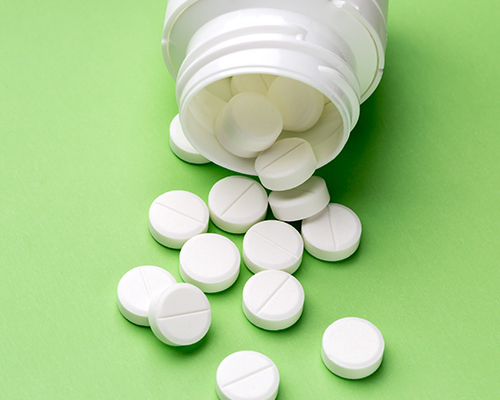
If you are like many American adults, you take multiple prescription medications each day to manage your chronic health conditions.1 Although these prescriptions may help to improve your overall health, you may not be aware of which medications can affect gout and increase your risk for gout flares.2
Urate-lowering therapy (ULT)
If you suffer with gout, you may take a ULT such as allopurinol, Uloric® (febuxostat), Zurampic® (lesinurad) or Krystexxa® (pegloticase).3-6 These medications have been shown to be a key part of long-term gout management because they can reduce the amount of uric acid in the bloodstream.3-6,7 However, it is important to understand that these medicines may cause gout flares.7 To minimize flares, the package inserts for these medications recommend the use of or non-steroidal anti-inflammatory drugs from the onset of treatment for as long as six months.3–6
Why ULTs can cause gout flares
As the ULT reduces the amount of uric acid in the bloodstream, urate crystals in the joints begin to dissolve.7 When the urate crystals start to dissolve, a gout flare can occur.7
The risk of ULT-related gout flares is highest in the first few months of treatment.3–6 However, certain medications may help prevent flares in gout patients who are beginning ULT.7
Preventing gout flares
The American College of Rheumatology (ACR) Guidelines for Management of Gout suggest that patients begin an anti-inflammatory medicine before or during ULT.8 Specifically, the ACR recommends low-dose colchicine (0.5 to 0.6 mg orally once or twice a day) as a first-line option for gout flare prevention.8 Research demonstrating the flare prevention benefits of adding colchicine to ULT date back as far as the 1960s.7
What other medications can affect gout?
In addition to ULT, a number of medicines have been shown to increase the risk of gout or worsen gout in patients who already have it.2,9-13 Some of these medicines are over-the-counter; others are available only with a prescription. These medicines include:
Diuretics2,9
Also known as “water pills,” diuretics help reduce the amount of fluid in your body by increasing how much you urinate. Doctors typically prescribe them to help reduce blood pressure, treat edema and manage heart disease. Because diuretics increase urination, the fluid that remains in your body is more concentrated and can put you at risk for developing the crystals that cause gout. Certain diuretics also reduce how much urate you pass in your urine, leaving you with more uric acid in your body, which can increase your risk of gout flares.
Salicylate-containing drugs2,10
Salicylate-containing drugs, including aspirin, can increase your risk for gout.2 Nearly one-third of middle-aged Americans (approximately 50 million people) take low-dose aspirin daily to help prevent cardiovascular disease.4 However, low-dose aspirin has been shown to reduce the amount of urate passed in the urine, resulting in an increase in the amount of uric acid in the body and a higher risk for gout.4
Niacin2,11
Also known as Vitamin B3 or nicotinic acid, niacin has been shown to increase the risk of gout.2 It is unclear whether this elevated risk is caused by an increase in the uric acid level or a reduction in the amount of uric acid passed in the urine.5
Cyclosporine2,12
Cyclosporine is used with other medications to prevent the rejection of a transplanted organ by the body’s immune system.2 It is believed that cyclosporine reduces the amount of urate passed in the urine, resulting in an increase in the amount of uric acid in the body and a higher risk of gout.6
Levodopa2,13
Levodopa, also known as L-dopa, is a medicine used to treat Parkinson’s disease. It is believed that either levodopa or one of its byproducts increases the risk of gout by raising the level of uric acid in the bloodstream.
Talk with your doctor
Be sure to tell your doctor about all of the medicines and supplements you take—both prescription drugs and over-the-counter products. Your doctor can tell you which medications can affect gout or raise your risk of gout flares, if any. Your doctor may also be able to recommend alternative treatments.
NOTE: This article was not written by a medical professional and is not intended to substitute the guidance of a physician. These are not West-Ward’s recommendations for gout flare prevention, but rather facts and data collected from various reliable medical sources. For a full list of resources and their attributing links, see below.
All registered trademarks are the property of their respective owners.
